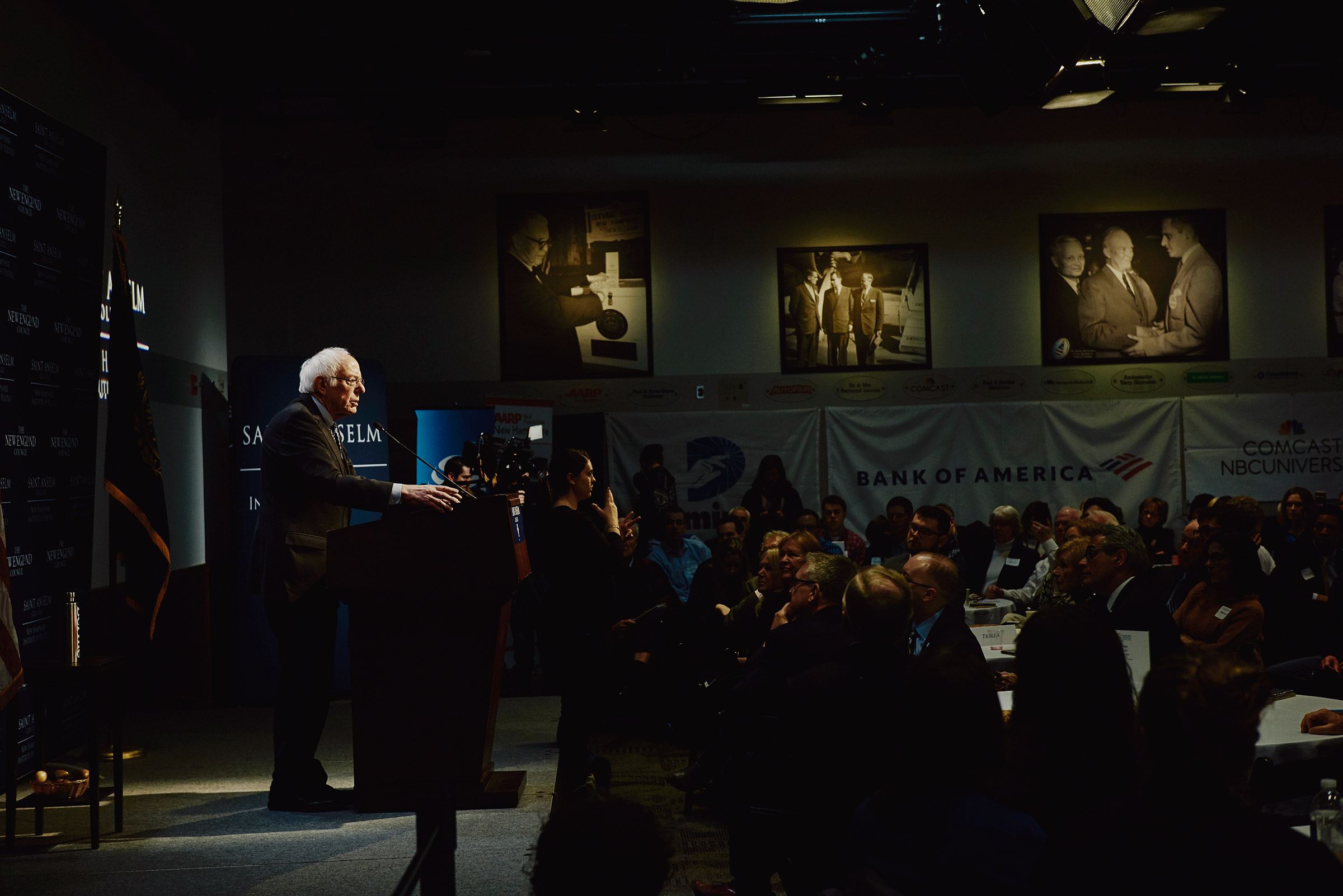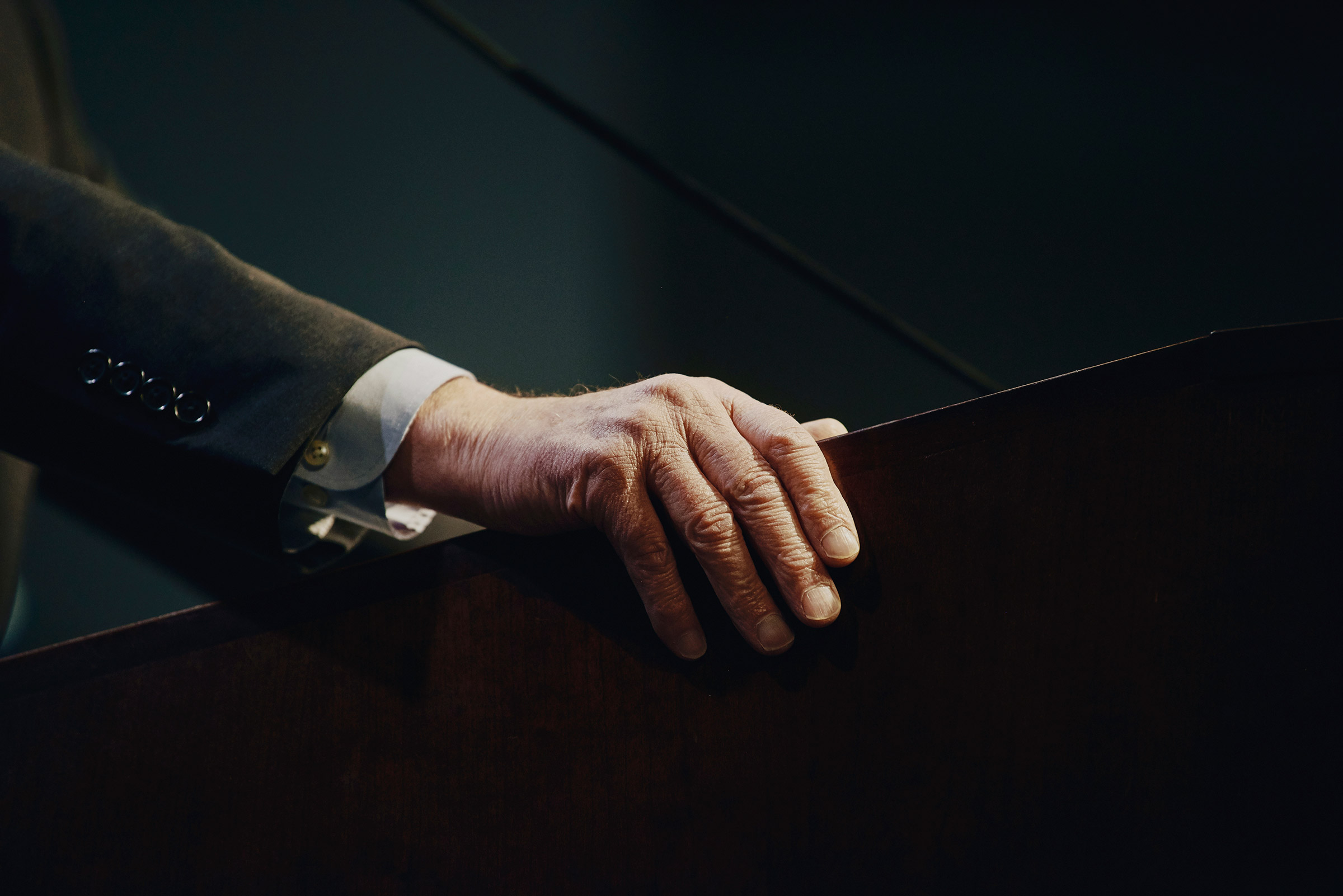
The Dartmouth Green is white with snow and decorated with a giant sea-monster snowman when Bernie Sanders arrives to greet a rowdy group of supporters at the Hanover Inn across the street. The fans create a half-circle around him and at one point start chanting his name. But Sanders isn’t content to bask in the cheers.
“We need a large turnout here on Tuesday,” Sanders tells them. “My plea to you is, on Tuesday, come out and vote. Bring your friends, your family, and everybody else. We need a large voter turnout.”
It’s good to be Sanders right now. He won the popular vote in Iowa and seems poised to win New Hampshire’s first-in-the-nation primary on Tuesday as well. While the moderates in the race skirmish with one another, Sanders—the new national front-runner for the Democratic presidential nomination—is coasting toward victory here, with no anti-Sanders ads on the air.
But Sanders has spent the last several days trekking around New Hampshire trying to get voters to show up at the polls. Despite his strong showing in Iowa, there were a few troubling signs. The Vermont Senator has been making the case that he will be able to expand the electorate and get new voters out to the polls to carry him to the nomination. Over and over, he said he will win if turnout is high, and lose if it’s low. Yet in Iowa, turnout for the 2020 caucuses was approximately 176,000 people — a number in line with 2016 and a far cry from the 2008 record of 240,000, which Democrats hoped to exceed.
Sanders acknowledges the turnout in Iowa was a concern to him. “I would have liked to have seen a higher turnout, and I think I can probably speak for every other candidate,” he said at a press conference last week. “I think all of us probably could have done a better job in bringing out our supporters,” he noted at the Feb. 7 Democratic debate in Manchester. Both times he pointed to the fact that there had been an increase in young caucus-goers as a sign of optimism.
But Iowa’s relatively disappointing turnout could be a symptom of a bigger problem, such as burnout among Democrats after three years of fighting President Donald Trump every step of the way. For Sanders, a candidate whose strategy has revolved around high voter participation, depressed turnout nationwide would be a significant obstacle.
Iowa was a mixed bag in other ways. Sanders excelled with young voters and in big cities, and defied the caricature of his supporters by attracting nonwhite Democrats. At the same time, he was outpaced by South Bend, Ind., Pete Buttigieg in suburbs and smaller towns and lost ground to Buttigieg in the final popular vote selection. The latter statistic suggests that while Sanders may have the largest bloc of devoted supporters, he isn’t making inroads with others as much as he might like.

Which is why Sanders, despite his position of strength, still has something to prove in New Hampshire, where he won in 2016 by 22 points. Traveling across the snow-blanketed state, I met plenty of Sanders supporters who think he can win the nomination without changing his message. But some voters who liked Sanders thought he could do a better job explaining his proposals. “I think that would win people over some more,” says Naaborko Sackeyfio-Lenoch, an associate professor of African history at Dartmouth. Sackeyfio-Lenoch voted for Sanders in 2016 and plans to vote for him again on Tuesday, but she attended the Hanover event in hopes of hearing more specifics.
Some voters here have raised questions about Sanders’ sweeping policy proposals, such as how he would pay for his Medicare For All plan. “Medicare for All is a big one for me, like how is this going to happen?” says Amalia “Mimi” Rhines, 30, of Claremont, N.H., who attended a Sanders town hall there on Sunday but is leaning toward voting for Sen. Elizabeth Warren. “When I hear Warren talk, I’m like, yes. And when I hear Bernie, I have a lot of questions.” Rhines thinks if Sanders becomes the nominee, he’s going to have to show “a willingness to adjust some of his massive plans” for voters who are not as familiar with him or come from a more conservative part of the country.
Sanders allies dismiss such concerns. At least one of Sanders’ surrogates says turnout in Iowa was depressed by several senators’ absence from the trail during Trump’s impeachment trial. “When you don’t have candidates on the ground,” Wisconsin Rep. Mark Pocan said, “that affects things.”
For now, Sanders seems to be worrying most about Buttigieg. He’s spent the week since the Iowa caucuses attacking the former mayor, zeroing in on his wealthy donors. Buttigieg has also returned fire. On Saturday night, both were among several presidential candidates who took the stage at the McIntyre-Shaheen 100 club dinner in Manchester, where prominent Democrats sat at tables surrounding the stage at ground level while thousands of the candidates’ supporters sat in the arena’s seats above them cheering on their respective candidates. “With a president this divisive, we cannot risk dividing Americans … further, saying that you must either be for a revolution or you must be for the status quo,” Buttigieg said, as the Sanders’ supporters erupted in booing.
At a canvass launch in Dover earlier that Saturday, Sanders gave an exaggerated impersonation of an establishment Democrat asking, “how do we stop Bernie Sanders and his movement?” The audience laughed. “Well they ain’t gonna stop it,” he said to applause.
More Must-Reads From TIME
- The 100 Most Influential People of 2024
- Coco Gauff Is Playing for Herself Now
- Scenes From Pro-Palestinian Encampments Across U.S. Universities
- 6 Compliments That Land Every Time
- If You're Dating Right Now , You're Brave: Column
- The AI That Could Heal a Divided Internet
- Fallout Is a Brilliant Model for the Future of Video Game Adaptations
- Want Weekly Recs on What to Watch, Read, and More? Sign Up for Worth Your Time
Write to Lissandra Villa/Hanover, N.H. at lissandra.villa@time.com
